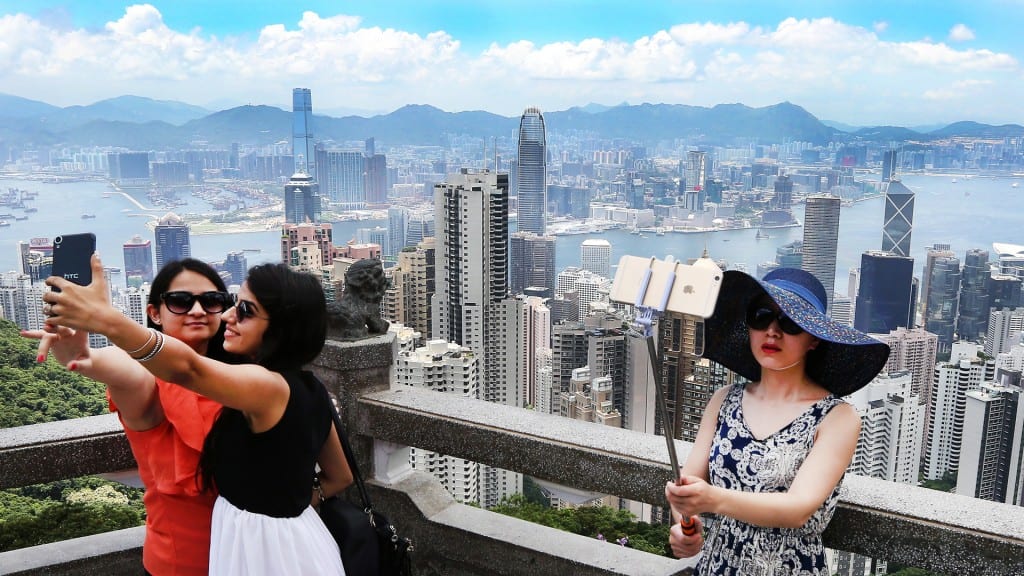

The city may also post the first annual decline in mainland tourists since it started allowing individual visitors from China, also in 2003, prompting calls for extensive diversification of the tourism trade—a key pillar of the city’s economy.
Chinese tourism spending has been the main driver of retail and commercial property-sector strength in Hong Kong in recent years, as the number of mainland tourists shot up. During the boom, long lines outside the city’s numerous Louis Vuitton, Chanel and Gucci shops were commonplace, as luxury goods sold in Hong Kong were up to 40% cheaper than in China.
Those lines have largely disappeared as inflows of Chinese tourists slowed. The number of Chinese tourist arrivals was 15.4% lower in November compared with a year ago, the steepest decline all year, extending the year-to-date fall in Chinese visitors.
Hong Kong’s tourism commission acknowledges that the city’s tourism industry has “entered a consolidation period” after a decade of growth, and says it is now targeting “high-spending overnight visitors” from other markets to help fill the city’s myriad shopping malls and hotel rooms.

ENLARGE
Meanwhile, retail sales in the formerly-bustling shopping hub have fallen for eight straight months on lower tourist spending, with total retail sales down 2.7% year-over-year for the first 10 months of 2015. That is steeper than the 2.6% decline recorded in 2003, when tourists shunned Hong Kong for several months during the SARS outbreak.
In October, Hong Kong saw a 38.5% drop in sales of Swiss watches, said the Federation of the Swiss Watch Industry. Other brands, like Chanel, went the unusual route of slashing the price of an iconic bag by over 24% in Hong Kong, among other rare discount offers, in a sign of the trying times.
“The ‘luxury supermarket’ image is no longer attractive” for Hong Kong, said Clement Kwok, chief executive at The Hongkong and Shanghai, owner of the city’s iconic Peninsula Hotel. The Peninsula Hotel saw occupancy rates drop 3% in the third quarter from a year earlier.
“There is an urgent need for a new marketing campaign to rebrand Hong Kong as a dynamic, exciting and relevant modern city,” said Mr. Kwok.
Luxury sales began their decline in late 2013 after Beijing started cracking down on corruption and conspicuous consumption. The slump has spread to mass market retailers this year as the Chinese economy slowed. Milan Station, a vendor of secondhand handbags, said revenue in its Hong Kong shops fell over 28% in the first half of the year, while cosmetic retailers Sa Sa and Bonjour reported revenue declines of 10.6% and 14.4% in the six months ended September and June, respectively.
Though shop rents and retail prices have dropped, they are still some of the highest in the world and could continue diverting tourist shoppers away from Hong Kong to cheaper prices elsewhere.
“The city has been very focused on Chinese tourists and shopping, and underinvesting in building new tourist attractions and experiences,” said Mariana Kou, an analyst at brokerage CLSA.
“Hong Kong needs to transform into a more diversified tourist destination,” she said.
China’s increasingly mobile and affluent middle class has meant big business for travel-related companies including airlines, travel agencies and luggage makers. And despite a slowing economy and a stock-market collapse this summer, they are projected to spend over $200 billion abroad for 2015.
While many countries have relaxed visa requirements to attract Chinese tourists, Hong Kong this year tightened visa limits for Chinese visitors from neighboring Shenzhen to one rather than multiple visits a week, amid heightened tensions between the local population and Chinese tourists. Mass protests against Beijing’s encroaching rule last year also kept visitors away.
The stronger U.S. dollar has also made traveling to Hong Kong more expensive, as the local currency is pegged to the dollar. Destinations with weaker currencies such as Japan and Europe have attracted Chinese vacationers there instead.
For its part, the Hong Kong government plans to host more large-scale dining and sporting events to boost tourism. It has already committed billions of dollars to develop new cultural and arts venues, and plans new waterfront attractions. It is also in talks to build a second Disneyland theme park.
But their construction could take years, and it could take a long time for the sites to attract a new, varied crowd. Until then, analysts say Hong Kong retail will likely continue its slump and companies will need new ways to attract business, as they can no longer depend on mainland tourists.
When Gao Hang, 26, first visited Hong Kong in 2013 she found it a “flourishing, great city.” She visited again in 2014, but this year, the customer service professional from the port town of Dalian opted for a vacation in Europe instead.
“There’s not that much to do in Hong Kong. One trip is really enough,” she said.